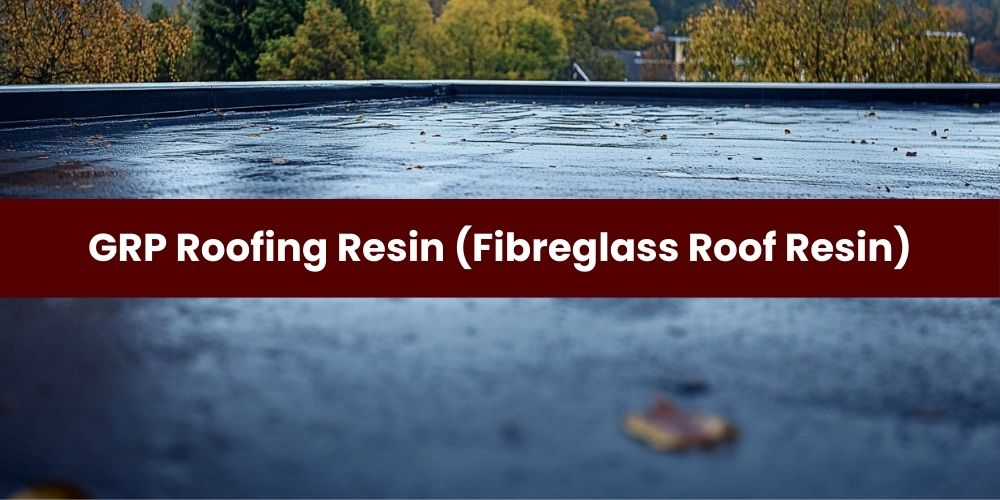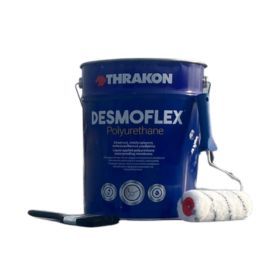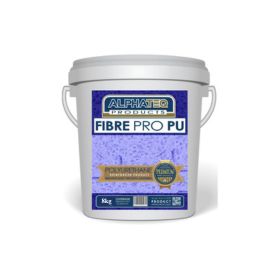What Is GRP Roofing Resin?
GRP roofing resin is a durable and water-resistant material composed of polyester resin and glass fibres, used extensively in flat roofing projects. GRP roofing resin is also often called fibreglass roofing resin. GRP roofing resin is renowned for its inherent strength combined with flexibility, making it ideal for creating seamless, leak-free surfaces on flat roofs. GRP roofing resin is applied as a liquid, allowing it to be shaped and moulded to fit a variety of roof designs, including those with complex features like skylights or edges. Once cured, the flat roof resin forms a solid layer that withstands harsh weather conditions and is resistant to chemical corrosion and UV degradation. Its maintenance is straightforward; regular inspections and cleaning typically suffice to preserve its integrity and extend its lifespan. Given these properties, GRP roofing resin is valued for its long-lasting performance and cost-effectiveness over time.
In the United Kingdom, GRP roofing resin is particularly advantageous due to its ability to handle the country's temperate maritime climate, which includes moderate temperature fluctuations and regular rainfall. The installation methods tailored for British conditions, such as using a catalyst to ensure effective curing even in cooler temperatures, are designed to maximize performance and durability while ensuring compliance with the UK's building regulations and standards.
Have a question about an upcoming project?
What Are The Benefits Of GRP Roofing Resin In The UK?
GRP roofing resin offers superior durability, weather resistance, and versatility for UK roofing needs. Due to the UK’s often unpredictable and harsh weather conditions, GRP (Glass Reinforced Plastic) roofing provides a reliable and long-lasting roofing solution. It is known for being watertight, low maintenance, and capable of accommodating complex roof structures, making it an ideal choice for various applications.
- Weather Resistance: Provides excellent protection against UK's rain, snow, and fluctuating temperatures.
- Durability: Offers longevity with minimal wear and tear, lasting several decades.
- Watertight Seal: Ensures complete waterproofing, preventing leaks and water damage.
- Low Maintenance: Requires little to no maintenance, saving on long-term repair costs.
- Versatility: Easily adapts to various roof shapes, accommodating complex designs efficiently.
1. Weather Resistance: Provides excellent protection against UK's rain, snow, and fluctuating temperatures.
Weather resistance is the capability of a roofing system to withstand the adverse effects of weather conditions such as rain, snow, and temperature fluctuations, ensuring the protection and longevity of a roof. The benefits of GRP (Glass Reinforced Plastic) roofing resin in the UK are enhanced by its superior weather resistance, which is crucial in a climate marked by frequent rainfall and seasonal temperature changes. This exceptional protection ensures that commercial properties maintain structural integrity and operational efficiency without being compromised by weather-induced wear or leaks. Utilising GRP roofing resin can significantly extend a roof’s lifespan by minimising the impact of moisture infiltration and thermal expansion or contraction. Its durability against weather extremities makes it a preferred choice for businesses seeking cost-effective long-term roofing solutions. Regular maintenance and inspections can further enhance its performance, ensuring that commercial roofs meet environmental challenges effectively and efficiently.
2. Durability: Offers longevity with minimal wear and tear, lasting several decades
Durability in commercial roofing refers to the ability of a roofing system to withstand environmental and physical stressors over a long period with minimal degradation in performance. GRP roofing resin, with its exceptional durability, provides a long-lasting solution for commercial buildings in the UK, where weather conditions can be unpredictable and harsh. The material's resilience ensures prolonged protection against moisture ingress, temperature variations, and other environmental factors, reducing the need for frequent repairs or replacements. This longevity makes GRP roofing resin a cost-effective investment, as businesses benefit from reduced maintenance costs and extended service life. Additionally, the robustness of GRP roofing reduces disruptive downtime for commercial operations, ensuring that the building remains functional and secured against environmental elements over the long term. Incorporating durable roofing materials like GRP resin is crucial for sustainable building practices and financial efficiency in commercial infrastructure.
3. Watertight Seal: Ensures complete waterproofing, preventing leaks and water damage.
A watertight seal is a specialised barrier designed to prevent the intrusion of water into roofing structures, thereby safeguarding against leaks and potential water damage. Watertight sealing is critical for maintaining the integrity of commercial roofing systems as it helps protect the building's interior from adverse weather conditions. This is particularly relevant when considering the benefits of GRP roofing resin in the UK, which is known for its seamless application and effectiveness in preventing water infiltration. GRP roofing resin offers exceptional waterproofing capabilities, making it a preferred choice for commercial projects facing unpredictable and wet climates. Its seamless application reduces the risk of weak points where water might penetrate, enhancing the building's overall resilience. Regular maintenance and inspections can further ensure that the watertight seal remains effective over time, prolonging the roof’s durability and service life.
4. Low Maintenance: Requires little to no maintenance, saving on long-term repair costs
Low maintenance in commercial roofing means utilising materials and systems designed to minimize routine upkeep, lowering the need for frequent repairs and associated expenses. Such a roofing system becomes advantageous in the UK when using GRP (Glass Reinforced Plastic) roofing resin, known for its durable and long-lasting properties. GRP roofing requires minimal attention once installed, providing a worry-free solution for UK businesses concerned with cutting down on maintenance-related disruptions and expenses. By selecting a low maintenance option like GRP roofing, businesses can achieve a long-term reduction in operational costs. This can especially be beneficial in areas with unpredictable weather patterns, as the robustness of GRP minimises the risk of damage that typically necessitates repairs. The combined benefits of enduring durability and reduced need for intervention allow facility managers to allocate resources more efficiently, focusing on other critical business operations instead of constant roofing concerns.
5. Versatility: Easily adapts to various roof shapes, accommodating complex designs efficiently.
Versatility refers to the capability of a roofing system, like GRP roofing resin, to conform to various architectural designs, facilitating its installation on roofs with intricate patterns. This adaptability is a significant benefit of GRP roofing resin, especially in the UK, where older buildings with unique and complex roofs are common. It enables installers to cover these elaborate shapes seamlessly, providing a uniform and durable protective layer without the need for cutting or wastage. The pliability of GRP material ensures it can be moulded to fit snugly around protrusions, such as skylights or vents, ensuring no gaps that could lead to leaks. Additionally, its seamless installation reduces joint-related weaknesses, bolstering overall roof integrity. This flexibility not only enhances the aesthetic appeal but also extends the lifespan of commercial roofing systems by minimising potential points of failure.
How Does GRP Roofing Resin Perform In The UK Climate?
GRP roofing resin performs well in the UK climate due to its durability and weather resistance. Specifically designed to withstand varying weather conditions, it provides a seamless, watertight barrier that protects against rain, snow, and wind. Additionally, GRP roofing resins are UV resistant, ensuring longevity and minimal maintenance in the face of extended sun exposure.
- Weather Resistance: Withstands UK's frequent rain and harsh weather without leaking or degrading.
- Durability: Provides a long-lasting roofing solution with minimal maintenance required over years.
- UV Protection: Resists UV exposure, reducing potential damage and extending lifespan.
- Seamless Application: Offers a continuous surface, preventing water ingress and enhancing performance.
- Temperature Tolerance: Remains stable across varying UK temperatures, minimizing expansion and contraction issues.
1. Weather Resistance: Withstands UK's frequent rain and harsh weather without leaking or degrading
Weather resistance is the ability of a roofing system to withstand harsh weather conditions like frequent rain, wind, and temperature fluctuations without compromising its integrity or performance. GRP roofing resin performs exceptionally well in the UK's challenging climate due to its hydrophobic properties that effectively repel water, preventing leakage. Its robust structure ensures that it remains unaffected by constant exposure to rain and wind, maintaining a tight seal that protects commercial buildings. This high level of weather resistance not only prolongs the lifespan of the roofing system but also reduces maintenance costs by minimising the need for frequent repairs. Investing in such a resilient roofing solution is crucial for businesses looking to safeguard their property assets from the UK's unpredictable weather patterns. Furthermore, GRP roofing's durability provides peace of mind, knowing that the roofing system remains stable and efficient during extreme weather events.
2. Durability: Provides a long-lasting roofing solution with minimal maintenance required over years.
Durability in commercial roofing refers to the capability of a roofing system to withstand adverse environmental factors and maintain its integrity with minimal upkeep over a prolonged period. In the UK climate, GRP roofing resin is particularly durable because it resists the frequent rainfall and variable temperatures typical of the region. This ensures a long-lasting, reliable roofing solution that requires minimal maintenance even in challenging weather conditions. Regular inspections and maintenance can also enhance the durability of GRP roofing resin by identifying potential issues early, thereby preventing more extensive damage. Additionally, using high-quality materials and installation practices further supports the longevity and performance of the roof. The robustness of GRP roofing makes it an attractive option for businesses seeking cost-effective and sustainable roofing solutions.
3. UV Protection: Resists UV exposure, reducing potential damage and extending lifespan.
UV Protection in roofing involves shielding materials from the harmful effects of ultraviolet light to prevent early deterioration and prolong the roof's functional life. For commercial roofing systems, UV resistive capabilities are crucial in climates that experience prolonged sunlight exposure, as they help maintain the structural integrity and efficiency of the roofing material. This is especially relevant when analysing roofing performance in diverse climates, such as the UK, where intermittent sunlight can still pose a risk over time. Enhanced UV Protection not only safeguards against physical damage like cracking and fading but also improves energy efficiency by reflecting a significant amount of solar radiation. This reflective property can reduce the cooling load on commercial buildings, contributing to lower energy costs. Additionally, integrating UV-resistant materials or coatings can support sustainability efforts by extending the lifespan of roofing systems, thereby reducing waste and resource consumption related to frequent roof replacements.
4. Seamless Application: Offers a continuous surface, preventing water ingress and enhancing performance.
A seamless application in commercial roofing refers to the installation of roofing membranes or coatings in a manner that creates a continuous, joint-free surface, effectively preventing water infiltration and enhancing overall roofing performance. The seamless nature of GRP roofing resin is particularly beneficial in the UK climate, known for its frequent rainfall and high humidity. Its continuous surface prevents water ingress, a critical factor in avoiding leaks and maintaining the structural integrity of the roofing system amidst the UK's challenging weather conditions. Seamless applications also contribute to improved energy efficiency by minimizing thermal bridging and maintaining consistent building insulation. Additionally, this type of application reduces the likelihood of maintenance issues, as there are no seams or joints that could become vulnerable over time. The durability and reliability of such roofing systems ensure long-term cost-effectiveness for commercial building owners.
5. Temperature Tolerance: Remains stable across varying UK temperatures, minimizing expansion and contraction issues.
Temperature tolerance refers to a roofing material’s ability to maintain its shape and structure without significant expansion or contraction when exposed to varying temperatures. GRP roofing resin is particularly well-suited for the UK climate due to its excellent temperature tolerance, which ensures reliable performance throughout seasonal changes. This stability helps prevent common structural issues associated with thermal expansion and contraction, such as cracking or warping, which can compromise the roof's integrity. The inherent adaptability of GRP roofing resin to temperature fluctuations reduces maintenance costs and enhances its durability, positioning it as a viable long-term solution for commercial roofing. By maintaining its form, GRP roofing eliminates potential leaks and extends the lifespan of the roof, providing both economic and practical benefits to commercial property owners. Its stable nature under UK weather conditions makes it an attractive, cost-effective option for businesses seeking to protect their investments over time.
What Are Common Issues With GRP Roofing Resin In The UK?
Common issues with GRP roofing resin in the UK include cracking, blistering, and poor weather resistance. These problems are often exacerbated by improper installation, sub-standard materials, and the UK's unpredictable weather conditions. Regular maintenance and proper installation can mitigate these risks, ensuring the longevity of GRP roofing.
- Cracking: Caused by temperature fluctuations and improper curing processes.
- Blistering: Results from trapped moisture and inadequate sealing techniques.
- Poor Weather Resistance: Struggles with the UK's harsh and diverse weather conditions.
- Discoloration: UV exposure leads to fading and loss of aesthetic appeal.
- Costly Repairs: Necessary when initial installation is incorrect or low-quality materials are used.
1. Cracking: Caused by temperature fluctuations and improper curing processes
Cracking refers to the development of fractures or splits in roofing materials, primarily due to the stresses from temperature changes and insufficient curing times. Cracking is a frequent issue with GRP roofing resin in the UK because the region's variable climate exacerbates thermal expansion and contraction, leading to material stress. The improper curing of GRP resin, a crucial step in ensuring durability, further predisposes these roofs to cracking when temperature variations are significant. To mitigate cracking in GRP roofs, it is crucial to adhere to recommended curing protocols and to use high-quality formulations designed to withstand the UK's climate variability. Regular inspections can help detect early signs of cracking, allowing for timely repairs before they progress. Incorporating these preventative measures ensures the GRP roofing system remains robust and long-lasting despite environmental challenges.
2. Blistering: Results from trapped moisture and inadequate sealing techniques.
Blistering occurs when trapped moisture under the roofing material causes air pockets to form, leading to raised areas on the roof surface. Blistering is a notable concern for GRP (Glass Reinforced Polyester) roofing in the UK where damp conditions prevail, increasing the likelihood of moisture being trapped during installation. This issue can compromise the roof’s waterproofing capabilities and eventually lead to leaks if not promptly addressed. To prevent blistering, it is crucial to follow proper sealing techniques and ensure the roofing surface is completely dry before applying GRP layers. Regular inspections allow for the early detection of any blisters, enabling timely repairs before they escalate into larger issues. Utilising high-quality sealants can also significantly improve the resilience of the roof against moisture intrusion.
3. Poor Weather Resistance: Struggles with the UK's harsh and diverse weather conditions.
Poor weather resistance refers to a roofing material's inability to withstand the UK's varied climates, leading to wear, leaks, or other structural issues. Commercial roofing systems in the UK, including GRP roofing resin, often face challenges due to the country's unpredictable and harsh weather patterns. These conditions can lead to expansion and contraction in the roofing materials, resulting in cracks, seams failures, and leaks over time. To combat poor weather resistance, it is crucial for commercial properties to invest in high-quality, watertight roofing materials specifically designed to endure the UK's climate. Regular inspections and maintenance can help identify potential weaknesses early, allowing for timely repairs that prevent costly damage. Additionally, implementing protective measures such as weatherproof coatings can extend the longevity of GRP roofing resin, ensuring its durability against adverse weather conditions.
4. Discolouration: UV exposure leads to fading and loss of aesthetic appeal.
Discolouration in commercial roofing refers to the fading and loss of original colour due to prolonged exposure to UV radiation, thereby diminishing the roof's visual and aesthetic qualities. Exposure to UV rays can exacerbate discolouration issues with GRP roofing resin in the UK, particularly as GRP materials can gradually degrade, causing a visible loss of colour. This can give the roof an uneven and aged appearance, affecting the building’s overall aesthetics and potentially leading to customer dissatisfaction. Maintenance of aesthetic appeal is crucial for commercial properties, where the roof's visual condition can impact perceptions of brand and asset value. To combat discolouration in GRP roofing, consider applying UV-protective coatings that reflect harmful rays and preserve the roof's color integrity. Regular inspections should be carried out to detect early signs of UV damage, enabling timely interventions to maintain the roof's aesthetic appeal and longevity. Implementing a routine maintenance schedule will help ensure that protective measures are effective, reducing the overall impact of UV-induced discolouration on the commercial property.
5. Costly Repairs: Necessary when initial installation is incorrect or low-quality materials are used
Costly repairs are often required when a commercial roof is initially installed with poor workmanship or substandard materials, leading to premature failures and extensive damage. GRP roofing resin in the UK can be vulnerable to issues if improperly installed, as the material requires precise application techniques to maintain its waterproofing and durability. Incorrect installation can exacerbate the need for costly repairs, especially when dealing with the unpredictable UK weather, which can quickly escalate minor issues into major roofing problems. Ensuring the use of high-quality materials and employing experienced roofing professionals can significantly reduce the risk of costly repairs. Regular maintenance checks and prompt attention to minor issues can also prevent the need for more extensive and expensive work in the future. By prioritising proper installation and material quality from the outset, commercial building owners can extend the lifespan of their roofs and minimize unexpected expenses.


